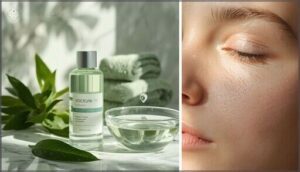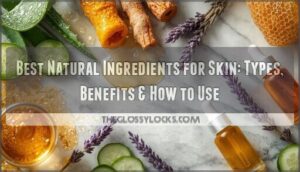This site is supported by our readers. We may earn a commission, at no cost to you, if you purchase through links.
Your skin absorbs about 60% of what you apply to it, which means those conventional products covering your bathroom shelf are delivering more than just hydration—they’re delivering synthetic chemicals that accumulate over time. If you’ve noticed sensitivity, inflammation, or that frustrated feeling when nothing seems to work, your skin might be telling you something important.
Switching to organic skin care isn’t just a trend; it’s a shift toward ingredients that work with your skin’s natural biology instead of against it. The good news is that making this change doesn’t require overhauling everything at once or breaking the bank—it’s about understanding what your skin actually needs and choosing products that deliver real results without the baggage.
Table Of Contents
Key Takeaways
- Your skin absorbs roughly 60% of topical products, so switching to organic skincare reduces your exposure to synthetic chemicals and endocrine disruptors that accumulate over time—studies show paraben levels drop 45% within three days of switching.
- Organic ingredients like aloe vera, jojoba oil, and green tea extract deliver measurable clinical benefits: aloe hydrates more effectively than water alone, jojoba increases hydration by 30% while mimicking natural sebum, and green tea reduces wrinkles by 36% through consistent application.
- Organic farming practices emit 40% less greenhouse gas and support 30–34% richer biodiversity than conventional operations, while certified organic products guarantee at least 95% organic plant ingredients with zero petrochemicals when you look for COSMOS or ECOCERT seals.
- Gradual transition works better than overhauling your routine overnight—replace cleansers first, then moisturizers, then treatments over several weeks to minimize breakouts and irritation while your skin adjusts to the new formulations.
Key Benefits of Organic Skin Care
Switching to organic skin care isn’t just about hopping on a trend—it’s about making a choice that affects your skin, your health, and the world around you.
Switching to organic skin care is a choice that transforms your skin, your health, and the world around you
When you understand what you’re really getting from these products, the decision becomes much clearer. Let’s look at the main reasons why organic options are worth your attention.
Reduced Chemical Exposure
One of the biggest wins in switching to organic skincare products is slashing your daily toxic ingredient awareness. Studies show that when adolescents traded conventional products for nontoxic formulas, their urinary paraben levels dropped by around 45% in just three days. You’ll cut exposure to endocrine disruptors and synthetic chemicals found in many conventional cosmetics:
- Chemical free living reduces your body’s burden of phthalates and parabens
- Eco friendly formulations eliminate siloxanes that conventional products release daily
- Clean ingredients mean fewer harmful ingredients accumulating in your system
Green beauty trends aren’t just hype—they’re backed by biomonitoring data showing natural preservatives offer real protection. Understanding phthalate safety is essential for making informed decisions about the products you use.
Improved Skin Health and Hydration
Beyond dodging chemicals, your skin barrier actually thrives with organic skincare routines—clinical trials show single applications of biomimetic natural skincare formulas keep hydration levels elevated for 24 hours. That’s cellular regeneration working overtime. Daily Aloe vera at 0.10–0.50% boosts moisture retention within two weeks, while sunflower oil cuts water loss in just one hour: Researchers have found that using snail mucin products can have a significant impact on skin health.
| Ingredient | Dermatological Wellness Benefit |
|---|---|
| Aloe vera extract | Increases skin hydration after 14 days |
| Sunflower seed oil | Accelerates skin barrier recovery in 1 hour |
| Aloe sterol (oral) | Reduces transepidermal water loss at 12 weeks |
| Macroalgae extracts | Boosts moisture within 1 hour of application |
| Polyherbal blends | Greater hydration than single-ingredient creams |
Your healthy skin deserves proven skin wellness ingredients.
Environmental and Sustainability Advantages
Your skin isn’t the only beneficiary—organic skincare slashes environmental damage too. Ingredient farms supporting green cosmetics emit 40% less greenhouse gas and nurture 30–34% richer biodiversity than conventional operations. Sustainable sourcing locks more carbon in soil and protects pollinators essential for botanical crops:
- Eco-friendly packaging innovations cut the beauty sector’s 120 billion annual waste units
- Biodegradable ingredients prevent waterway contamination after use
- Renewable resources maintain 65% more crop diversity
- Sustainable beauty practices reduce deforestation-linked habitat loss
Cruelty-Free and Ethical Practices
Beyond the planet, your organic skincare choices protect animals and workers. Forty-five countries now ban cosmetic animal testing, while cruelty-free brands command 36% of consumer preference.
Ethical sourcing certifications like Fair Trade guarantee safe wages for ingredient harvesters, and corporate accountability pushes vegan cosmetics toward supply chain transparency—verifying that mica miners and argan oil cooperatives receive fair treatment throughout production.
Essential Organic Skin Care Routine Steps
Building an effective organic skincare routine doesn’t have to be complicated. The key is following a logical sequence that works with your skin’s natural rhythm throughout the day.
Here’s how to structure your routine from morning to night for best results.
Gentle Cleansing With Organic Ingredients
Think of your cleanser as the foundation of your organic skincare routine—choosing one with natural surfactants and plant-based ingredients protects both your microbiome balance and skin barrier.
For sensitive skin, gentle exfoliants like fruit enzymes offer effective cleansing without irritation. Look for sulfate-free formulations with organic preservatives, as these gentle skincare options maintain hydration while removing impurities naturally.
Toning and Balancing Skin PH
After cleansing, you need a toner to restore your skin pH balance—ideally, your skin pH levels should hover around 4.7. Acidic toners made with natural balancers like green tea or aloe work best, since pH imbalance can weaken your barrier and invite unwanted bacteria.
Skip harsh organic exfoliants in this step; focus on gentle, plant-based formulas that support your natural skincare goals.
Moisturizing With Natural Oils
Your skin barrier repair depends on choosing the right natural oil blends for your face. Jojoba oil mimics your sebum, reducing transepidermal water loss by nearly 1 g/h/m² in clinical trials, while rosehip and argan oils delivered measurable hydration increases in controlled studies.
Oil absorption rates vary—lightweight facial oil treatments work for oily skin, richer moisturizer textures suit dry types. Always patch-test plant-based ingredients first.
Sun Protection Using Mineral Sunscreens
Mineral sunscreens are your organic skincare’s final defense. Zinc oxide provides the broadest spectrum coverage, shielding against both UVA and UVB rays, while titanium dioxide targets shorter wavelengths.
Together, these physical filters reflect UV radiation rather than absorbing it into your skin—a vital distinction for sensitive skin types. SPF 30 blocks about 97% of UVB rays, offering meaningful protection without unnecessary chemical exposure.
Apply generously to all exposed areas daily.
Nighttime Nourishment and Repair
Your circadian rhythm peaks between 11 pm and midnight, when cellular renewal and DNA repair accelerate dramatically. That’s your window to apply organic serums and night moisturizers rich in botanicals like aloe vera and rosehip oil.
These ingredients boost skin regeneration during sleep, delivering up to 128% improved hydration and reducing trans-epidermal water loss. Layer heavier formulas after cleansing to support your skin’s natural nourishment cycle and optimize barrier repair overnight.
Choosing The Right Organic Products
Switching to organic skincare is one thing—finding the right products for your unique skin is another. Not all organic products are created equal, and what works beautifully for someone else mightn’t be the best fit for you.
Let’s walk through how to make confident choices that align with your skin’s needs and your values.
Identifying Your Skin Type
Your skin type isn’t one-size-fits-all—it exists on a spectrum. Understanding whether you’re oily, dry, combination, or sensitive determines which organic products will actually work for you. Clinical assessments combine your self-reported experience with biophysical markers like transepidermal water loss and sebum levels to guide dermatological classification.
Here’s what shapes your skin type:
- Regional oiliness (T-zone versus cheeks)
- Hydration and barrier function
- Sensitivity responses to environmental stimuli
Understanding Certification Standards (e.g., COSMOS, ECOCERT)
Now that you’ve identified your skin type, certification becomes your compass. When you’re shopping for organic skincare, look for third-party seals like COSMOS or ECOCERT—they’re your guarantee that what’s on the label actually matches what’s inside.
These independent verifications mean at least 95% organic plant ingredients and zero petrochemicals. Ninety-four percent of consumers trust COSMOS certification specifically. Think of these eco labels as your assurance that regulatory compliance isn’t just marketing speak.
Performing Patch Tests for Sensitivity
Even with trusted certifications, your skin deserves an individual check. Here’s where patch testing comes in—a simple yet powerful way to catch potential reactions before they become a problem.
Apply a small amount of your new product to clean skin, usually on your inner arm or behind your ear. Leave it untouched for 48 hours, then monitor for any irritation, redness, or itching over the next few days. This dermatological evaluation catches allergen sensitivity early, giving you control over what touches your face.
Think of it as your skin’s safety protocol.
Must-Have Organic Ingredients for Skin Health
Now that you’ve picked the right products for your skin type, it’s time to focus on what’s actually inside them. The most effective organic skincare comes down to a handful of powerhouse ingredients that do the heavy lifting for your skin.
Here are the essential ones you should know about and look for on those labels.
Aloe Vera for Soothing and Hydration
Think of aloe vera as your skin’s emergency responder. This exceptional succulent contains polysaccharides and anti-inflammatory enzymes that work to reduce redness and inflammation within minutes. Clinical studies show aloe vera hydrates skin more effectively than water alone, with effects lasting up to 150 minutes after application. It’s particularly valuable for sunburns, eczema flare-ups, and compromised skin barriers.
- Reduces inflammation and redness through anthraquinone compounds
- Hydrates skin more effectively than standard moisturizers
- Accelerates wound healing by up to 8.8 days faster
- Soothes irritation without harsh chemical interventions
- Aids skin regeneration and barrier restoration
Jojoba and Rosehip Oils for Moisturizing
While aloe vera excels at immediate relief, jojoba and rosehip oils offer sustained moisturizing through different mechanisms. Jojoba’s wax composition mimics your skin’s natural sebum, increasing hydration by 30% within minutes while strengthening your barrier.
Rosehip delivers essential fatty acids and carotenoids that combat oxidative stress and support collagen. Together, these plant-based ingredients create complementary oil blending benefits—short-term hydration meets long-term repair.
Both are noncomedogenic, making them ideal for sensitive skin seeking natural antioxidants without pore clogging.
Green Tea Extract for Antioxidant Protection
Green tea extract stands as one of organic skincare’s most scientifically validated powerhouses, delivering potent antioxidant benefits that shield your skin from environmental stress. The polyphenols—particularly EGCG—neutralize free radicals and block UV damage at the cellular level.
Here’s what this plant-based ingredient accomplishes:
- Reduces wrinkles by 36% through consistent application
- Inhibits free radical production by 50–60%
- Protects against UV-induced DNA damage
- Calms inflammatory skin conditions like acne
Your skin’s natural defenses strengthen considerably with regular green tea SPF 30 formulations, making this organic ingredient essential for long-term protection and visible rejuvenation.
Fruit Enzymes for Gentle Exfoliation
Fruit enzymes—papain from papaya, bromelain from pineapple—offer a gentler alternative to harsh scrubs by breaking down only dead skin’s outermost layer. Unlike physical exfoliants, these botanical enzymes minimize irritation and micro-tears, making them ideal for sensitive or acne-prone skin.
Applied one to three times weekly, they resurface skin, reduce scars, and brighten complexion while maintaining your skin barrier’s integrity. This targeted, natural approach delivers visible results without compromise.
Tips for Sustainable and Safe Organic Skincare
Making the switch to organic skincare doesn’t have to be complicated, but it does require some thoughtful decisions—both for your skin and the planet.
From reducing waste to managing product storage and knowing when to call in a professional, there are practical steps you can take right now.
Let’s walk through the safest, most sustainable ways to move forward with your routine.
Minimizing Packaging Waste
Your skincare choices directly impact our planet—over 95% of beauty packaging ends up as waste after single use.
Shift toward eco-friendly skincare by choosing refill systems and zero-waste formats like solid bars, which drastically reduce plastic consumption. Opt for sustainable materials: glass, aluminum, and cardboard packaging over conventional plastics.
Support brands implementing recycling practices and refillable designs. These small switches collectively transform your routine into genuine green beauty that protects both your skin and the environment.
Storing Products to Maximize Shelf Life
Your organic products are only as good as how you store them. Think of these formulas as living ecosystems—they’re sensitive to heat, light, and air exposure. Here’s what protects your investment:
- Keep products below 75°F in cool, dry places away from bathroom humidity
- Use amber glass or opaque containers to block UV radiation and slow oxidation
- Replace caps immediately after use; pump bottles minimize oxygen exposure
- Check PAO symbols—most organic products last 6–24 months after opening
Proper storage means maximum efficacy and safety.
Transitioning Gradually From Conventional to Organic
Switching to organic formulations doesn’t mean overhauling everything overnight. Your skin needs time to adapt—and so does your routine. Start by replacing products that touch your skin directly: cleansers, then moisturizers, then serums. This gradual shift minimizes adverse reactions while your skin adjusts. Research shows that introducing new organic alternatives incrementally reduces breakouts and irritation.
| Phase | Timeline |
|---|---|
| Replace cleansers | Week 1–2 |
| Add moisturizer | Week 3–4 |
| Introduce treatments | Week 5+ |
| Monitor & adjust | Ongoing |
Patience pays off.
Consulting Professionals for Skin Concerns
When persistent irritation or unexpected reactions surface, professional guidance isn’t optional—it’s essential. Board-certified dermatologists diagnose skin conditions with precision, and you don’t need an office visit anymore. Teledermatology services now make expert skin analysis accessible instantly through video consultations or store-and-forward platforms.
Why consult a professional?
- Accurate diagnosis prevents trial-and-error with organic products
- Virtual consultations identify underlying sensitivities driving your skin irritation
- Dermatologist advice ensures your routine promotes long-term skin health
Frequently Asked Questions (FAQs)
How long does it take to see results with organic skincare?
Results usually emerge within one to two weeks for hydration and redness, though meaningful skin renewal takes four to six weeks. Mature skin may need eight to twelve weeks.
Consistency matters—daily use reveals the most dramatic improvements as your skin cycle completes its natural renewal process.
Can organic products expire or go bad?
Here’s the irony: products marketed as “pure” actually expire faster. Organic skincare lacks synthetic preservatives, so unopened products last one to three years, while opened ones degrade within six to twelve months. Water-based formulas spoil quickest—watch for color changes, off odors, or texture shifts indicating microbial growth or oxidation.
Why do some organic products cost more than conventional ones?
Organic products command higher prices due to elevated ingredient costs—sourcing clean materials runs 20–30% more than conventional alternatives.
Add certification fees, premium packaging, and fair-trade labor practices, and you’re looking at a fundamentally different production model that justifies the investment in your skin’s health.
Conclusion
Think of your skin as a garden—what you nurture it with shapes its resilience and radiance. Each organic choice you make is a seed planted for long-term health, reducing chemical weeds and cultivating genuine vitality.
By following these organic skin care tips, you’re not just tending to the surface; you’re investing in an ecosystem that thrives on thoughtful care. Let your routine be a gentle ritual, where every product enhances the natural beauty your skin is meant to reveal.
- https://pmc.ncbi.nlm.nih.gov/articles/PMC3858659/
- https://dermnetnz.org/topics/contact-reactions-to-cosmetics
- https://onlinelibrary.wiley.com/doi/10.1111/jocd.15734
- https://clinicsearchonline.org/article/prevalence-of-skin-sensitization-among-undergraduate-females-at-buitems-caused-by-exposure-to-cosmetic-products
- https://www.statnews.com/sponsor/2020/06/05/clinical-trials-test-natural-skincare-with-the-same-rigor-as-synthetics/












